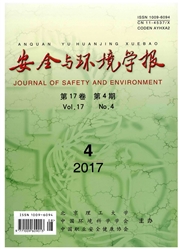

 中文摘要:
中文摘要:
利用植物根尖细胞微核技术,研究不同质量浓度的亚砷酸钠(0.3mg/L,1.0mg/L,3.0mg/L,10.0mg/L,30.0mg/L)对蚕豆和洋葱根尖细胞的遗传损伤效应。研究结果表明,用亚砷酸钠处理12h后,可诱发蚕豆(亚砷酸钠质量浓度0.3—30.0mg/L)和洋葱(亚砷酸钠质量浓度1.0—30.0mg/L)根尖细胞遗传损伤,使根尖细胞微核率增加、分裂指数下降。在一定处理浓度范围内(蚕豆的为0—3.0mg/L;洋葱为0—10.0mg/L),细胞微核率与处理浓度呈正相关(P〈0.01);分裂指数与处理浓度呈负相关(P〈0.01)。研究表明,亚砷酸钠能引起植物细胞遗传物质损伤,因此,可利用蚕豆和洋葱根尖细胞微核技术检测环境中的砷污染。
 英文摘要:
英文摘要:
This study is concerned about an approach to evaluating the genotoxicity of sodium arsenite on the root tip ceils of Vicia faba and Allium cepa by using the root tip micronucleus (MN) assay. As is known, arsenite is a kind of most ubiquitous environmental contaminants usually brought about by the large-scale mining or other industrial and agricultural activities. Epidemiological evidence reveals that long-term arsenic exposure may lead to occurrence of various human diseases and even cancers. On the other hand, broad bean ( Vicia faba L. ) and common onion ( Allium cepa L. ) are excellent plants for the assay of chromosome aberrations after chemical treatment. It is for this purpose that we have done a series of experiments to test the genotoxicity of sodium arsenite on the root tip ceils of Vicia faba and Allium cepa. Our experimental results have shown that sodium arsenire is likely to induce MN formation in a concentration-dependent way, which is statistically different from the control (p 〈 0.05 and 0.01, respectively) of Vicia (0.3 - 10.0 mg/L) and Allium (1.0 - 30.0mg/L) root tips after a 12 h exposure. In addition, arsenite is likely to cause the increase of ceil-cycle length and decrease of concentration-dependent mitotic index. Thus, our research proves that Vicia and Allium root tip micronucleus (MN) assays can be used as a method for monitoring arsenic water contamination.
 同期刊论文项目
同期刊论文项目
 同项目期刊论文
同项目期刊论文
 期刊信息
期刊信息
